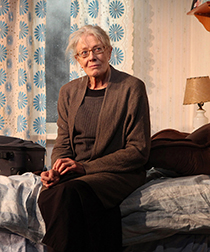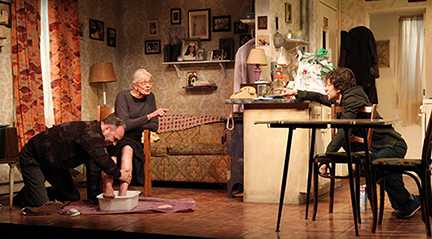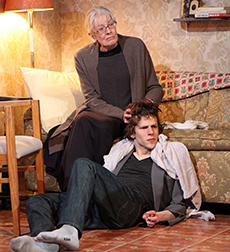By Lucy Komisar
Jesse Eisenberg‘s play about the importance of family to which a holocaust survivor clings takes life through the fine, transformative acting of Vanessa Redgrave. The story itself is a pas de deux, or better, a psychological duel between Maria (Redgrave), who was 4 years old when the holocaust in Poland took her parents and siblings, and David (Eisenberg), a not terribly successful New York writer who comes to visit his second cousin in a Polish town near the north coast. Director Kip Fagan makes us believe that the most unlikely events we see really happened.

David, in his 20s, arrives with street clothes and a stash of pot. Maria, 75, shuffles and has her gray hair in a bun. Her small apartment is filled with photos of family members in the U.S., all but one of whom she has never met. But she instructs David about the connections, who is married to whom, who is the child of whom, etc. She watches CNN on television, perhaps a connection to her American relatives.
Maria is dominating in a nice way. She wants to include him in her extended family. She makes chicken for his arrival. He is carelessly unappreciative and announces that he‘s a vegetarian. It‘s a way of saying their two worlds clash. She tells him to say a Jewish prayer over the food. He says, “You‘ve got to be kidding.”
David wants to smoke pot and pushes open the window transom in his room even though she tells him not to because the heat is expensive. Turns out he arrived only because she was his last chance for a free room in which he could revise a book his editor found unacceptable. You really want to not like this flip guy.

But Maria is also challenging. She has framed the bad NY Times review of a young adult book he wrote. She wants him to sign it. He wants to tear it up.
He is offended when a middle-aged cab driver-friend (the blustery Daniel Oreskes) arrives to shave Maria‘s legs. She lets him do it because reminds him of his dead mother for whom he performed the same service. (Maria is a widow and doesn’t seem to have other friends.)
Rather weird, I thought. Is this the weird sense of family a 20-something playwright like Eisenberg might think of?
Emphasizing how bizarre David considers this world, we see him lying in bed reading a Lonely Planet book about Poland as if it were some travel curiosity.
All of this is prelude to the essence of the play. David wants to know more about Maria‘s past; she is reticent. Finally, she opens the vodka. She gets drunk; he gets drunk. And you learn what happened in 1939. It involves a big surprise about the family that means so much to Maria. But David the writer will not realize that this is a great story. Maybe that would have gotten in the way of the play, but it‘s the first thing that I, a writer, thought of. (There are a few other unlikely plot events that seem to be loose ends the playwright should have tied up.)

Eisenberg is very good as the insensitive young man who feels entitled to a free room at his cousin‘s place without displaying any of the niceties a host might expect.
Redgrave of course is brilliant in her subtle, understated performance as Maria. My standard for great theater artists is that they can express powerful emotions without raising their voices. She so thoroughly inhabits her character that the loneliness that drives her is palpable.
“The Revisionist.” Written by Jesse Eisenberg; directed by Kip Fagan. Rattlestick Theater at Cherry Lane Theatre, 38 Commerce Street, New York City. 866-811-4111; info@rattlestick.org. Opened Feb 28, 2013; closes April 27, 2013. 3/24/13. Review on New York Theatre Wire.


Thanks for taking us there! You have mastered the art of theatre criticism first demonstrated by the long-forgotten Victorian critic George Henry Lewes, who actually saw Keane and Macready and French actress Rachel in the early and mid eighteen hundreds, and introduced us to the idea of natural and realistic acting.
Is Vanessa today’s Rachel? More on the experience of the performance, and less on the intellectual side of it, always. Keep them coming!